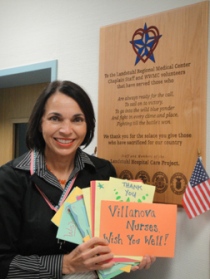Serving those who serve
Villanova, PA, August 31, 2010 — Summer was a busy yet rewarding time for Carol Toussie Weingarten, PhD, RN, ANEF, associate professor in the College of Nursing. She and husband Michael S. Weingarten, MD, MBA, FACS, a VSB alumnus and professor of Surgery at Drexel University School of Medicine volunteered for their second consecutive summer working with the troops at Landstuhl Regional Medical Center (LRMC) in Germany. Inspired by their two-week mission last year, they did not hesitate to return in 2010 and are already slated to go back next July. "Courage, teamwork, superb care and kindness," is how Dr. Weingarten summarizes the environment there, which was a good fit for her specialty area of health promotion and wellness.
LRMC is the largest American military hospital outside the United States, to which ill and wounded troops are taken from such places as Afghanistan and Iraq. Transition is a hallmark of LRMC, where the length of stay for inpatients can range from one to three days. Outpatients are housed for up to 14 days at the Medical Transient Detachment. Some patients are airlifted back to the U.S. for further care while others return downrange.
Through the Society for Vascular Surgery in cooperation with the American Red Cross, Dr. Michael Weingarten served as a volunteer vascular surgeon in the Combat Casualty Program where his skills were needed in the operating room and intensive care unit. Because there is no parallel nursing program, Dr. Carol Weingarten worked with outpatients as a civilian volunteer with the Chaplains' Wounded Warrior Ministry Center (WWMC) Projects. WWMC was created to provide comfort items like clothing and toiletries for wounded or ill service members but has expanded to provide further comfort. The WWMC incorporates several strategies to promote mental and spiritual health including combat support dinners, supervised trips for troops to areas of local interest and the Chaplains' Closet –a "free" store with toiletries, adaptive clothing, handmade blankets, music, sweets and card s from well-wishers. The programs are supervised by pastoral care staff enhanced by volunteers, as appropriate, and contracted behavioral health specialists. Time itself can be a stressor as it stretches between tests and treatments. Dr. Weingarten explains, based on the time she spent supporting troops on the local trips and working with them at the Chaplain's Closet, "I realized early in my experience as a WWMC civilian volunteer that (this was) a perfect placement for me. From a nursing perspective, the WWMC and its related projects are examples of health promotion." Her work did not stop there.
"This year I undertook a nursing journalism project at LRMC. In 2009 I met and saw so many extraordinary nurses that I got permission from the Public Affairs Office and the Director of Nursing to interview nurses and staff in a variety of areas. I was welcomed everywhere," notes Dr. Weingarten. Her work showcasing the efforts of the Army, Navy, Air Force and civilian nurses at LRMC will be published this October in The American Journal of Nursing and she targets a future publication in Pennsylvania Nurse. She is speaking this fall at the state Student Nurses' Association of Pennsylvania (SNAP) convention about the couple's experiences (she is the advisor for the Villanova Chapter of SNAP). In April, she and her husband are likely speaking together at the National Student Nurses' Association convention. Her final thought? Dr. Weingarten reflects, "As I listened to each fascinating story, I realized that nursing becomes part of who you are, whether you are the interviewer or the person being interviewed."

